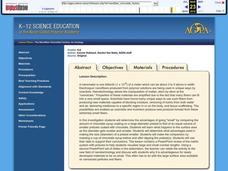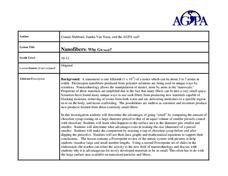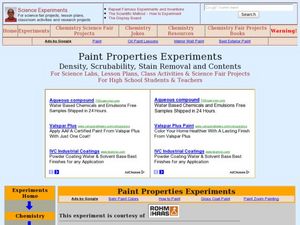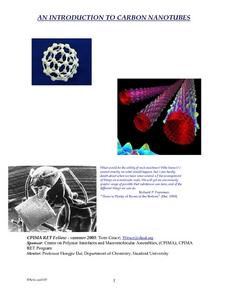Curated OER
The Miracle Fish: Learning to Design an Experiment
Young scholars investigate the behavior of a miracle fish. In this life science lesson, students write a procedure about the fish experiment. They collect data, construct graphs and draw conclusion at the end of the lab.
Curated OER
The Nanofiber Chocolate Factory: An Analogy
Learners discuss the advantage of using nanotechnologies. In this chemistry lesson plan, students mass the pretzels before and after dipping them in chocolate. They collect data and compare results in class.
Curated OER
Nanofibers: Why Go Small?
Students explain the advantages of nanotechnology. In this chemistry lesson, students investigate pretzels' average diameter and circumference. They graph their result and compare with other groups.
Curated OER
One Plus One Makes New
Students identify the different properties of matter. For this chemistry lesson, students design an experiment on a property of matter they would like to investigate. They report their findings in class.
Curated OER
Physics on the Playground
Second graders explain how friction affects the motion of moving objects. In this physics lesson, 2nd graders investigate how different materials move down the slide. They share their observations with each other.
Curated OER
Plastics and Rubber: What's the Difference?
Students classify household items into either plastic or rubber. In this chemistry lesson, students justify their classification system. They explain the difference between observation and inference.
Curated OER
Study the Fizz
Pupils hypothesize about the amount of carbon dioxide in soda bottles. In this chemistry lesson, students design an experiment to solve the problem. They share findings in class.
Curated OER
Where Did the Water Go? An Investigation in Scientific Methods
Students hypothesize what happened to the missing water. In this chemistry lesson, students test their hypothesis by designing an experiment. They record observations and report findings to class.
Curated OER
Where in the World is Rubber?
Students research countries where rubber is naturally produced. In this geography lesson, students create a poster from their researched information. They present their poster in class.
Curated OER
Where to Live?
Learners decide where they want to live in US. In this geography lesson, students select their residential preferences. Using GIS, they determine the location that meets their preferences.
Curated OER
You Are What You Eat!
Students calculate the calorie content of food. In this chemistry lesson, students plan a healthy meal based on RDA. They devise an exercise to burn extra calories.
Curated OER
To Smell or Not to Smell, That is the Ester
Students explain the basic concepts of polymerization. Students participate in a lab to create a crude preparation of carboxyl esterase and test its effectiveness in reducing the residual monomer in an emulsion such as paint.
Curated OER
Adventures With Super-Absorbers and Substance Solubility
Learners understand the concepts of absorption, swellability and solubility and recognize that science is all around us in our everyday lives and is fun to explore.
Curated OER
Creating an Autobiographical Amulet Necklace
Students create their own personalized amulet necklaces after viewing images of artifacts from different cultures.
Curated OER
Genetics DNA Replication
Students explore DNA replication. Beginning with a teacher led discussion, students examine inherited information, genes, and Deoxyribose Nucleic Acid (DNA). As the teacher models the structures of DNA, tells about the contributions of...
Curated OER
Marbles and Momentum
Students examine the law of conservation of momentum. In this physics lesson, students play marbles in order to compare the mass of the marble and velocities effects. Students receive directions of the marbles game and collect data while...
Curated OER
Nanofibers: Why Go Small?
Students explore the surface ratio of an object. In this surface area to volume lesson students construct a data table, make calculations and create a graph.
Curated OER
Quantitative Determination of the Composition of Water-based Paints and the Correlation of Paint Properties to Pain Composition
Students perform a series of tests on water-based paints. In this chemistry lesson, students identify their different functions. They calculate paint density and fractional concentrations.
Curated OER
A Comparison of Polymeric Liquids with Newtonian Liquids
Students perform several tests on liquids. In this general science lesson, students compare the properties of polymeric and nonpolymeric liquids. They explain the composition and importance of macromolecules.
Curated OER
Circuits
Students draw a schematic diagram of parts needed to build an op-amp. In this physics lesson, students test the operation of their machine. They graph and analyze data using excel.
Curated OER
A Natural Habitat: What, How and Why
Students understand what a habitat is. They determine why a habitat is important to our environment no matter where it is located. Students observe and recognize natural habitats in their surroundings.
Curated OER
Painting with and Learning From Art History - Extend the Composition
Students create a painting based on an artist from a chosen period in history. They research a modern artist and write a critique.
Curated OER
Enzyme Lab
Pupils examine the effects of specific enzymes on samples of liver tissue, muscle tissue (chicken), apples, and potatoes.
Curated OER
An Introduction To Carbon Nanotubes
Students engage in a study of nanotechnology that is meant to be an enrichment to the already established chemistry curriculum of high school. They are encouraged to make connections to daily life. The lesson includes background...
Other popular searches
- Polymerase Chain Reaction
- Condensation Polymerization
- Polymers Plastics
- Monomers and Polymers
- Polymer Science
- Plastic Polymer
- History of Polymers
- Polymer Clay
- Monomers & Polymers
- Disposal of Polymers
- Making Polymers
- Uses of Polymers

























